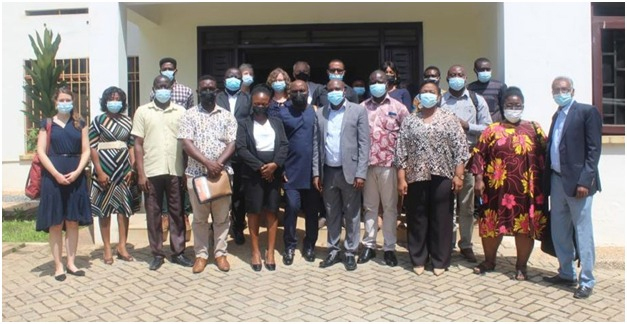Workshop participants in a group photo
Rather than discouraging people from moving out of environmentally degraded areas, policy makers have been urged to formulate programmes that ensure migration occurs in a way that maximizes benefits to vulnerable households, sending areas and destinations.
Research undertaken by the Centre for Migration Studies (CMS), University of Ghana (UG) in the Upper West and Eastern regions, revealed that despite efforts by the government and development partners to enhance resilience to climate change, the proportion of farmers who are able to effectively adopt in-situ adaptation strategies like irrigationremained low.
Conducted under the Governing Climate Mobility (GCM) Project, the study revealed that climate change variability is a serious developmental challenge in the savannah and forest zones which requires a realistic approach in finding ways for communities to adapt.
The GCM project, funded by the Danish Development Research Council, seeks to determine how differing governance contexts, national and local, affect adaptive climate mobility in Ghana and Ethiopia.
Existing research shows that agrarian households are affected by climate change because they depend on rain-fed agriculture and ecosystem services. Also as a result of weak adaptive capacity, recurrent drought has caused crop failure, food insecurity, poverty, and population mobility in some parts of Ghana.
Director of CMS, Professor Joseph Teye, speaking at a dissemination meeting in Accra saidalthough there is literature on climate change and migration, the nature of their relationship remained under-researched.
The project, he said, relied on field data to make recommendations to government agencies and ministries on how institutional interventions and practices could be used to support adaptive climate mobility.
“The main objective of today’s workshop is to build policy coherence in the area of governing climate mobility by providing a platform for various stakeholders to discuss the findings of the GCM project,” he added.
He said apart from making migration profitable to vulnerable households, farmers need to be supported to adopt in-situ adaptation strategies like irrigation, fertilizers and smart agriculture.
Programme Coordinator, Danish Institute for International Studies, Dr. Neil Webster, said the GCM project is conducted in collaboration with the Forum for Social Studies, Addis Ababa, Ethiopia and CMS, University of Ghana.
“We work with stakeholders in Denmark, Ethiopia and Ghana, including relevant formal and informal institutions, affected communities, policymakers ad researchers,” he added.
By Jamila Akweley Okertchiri


